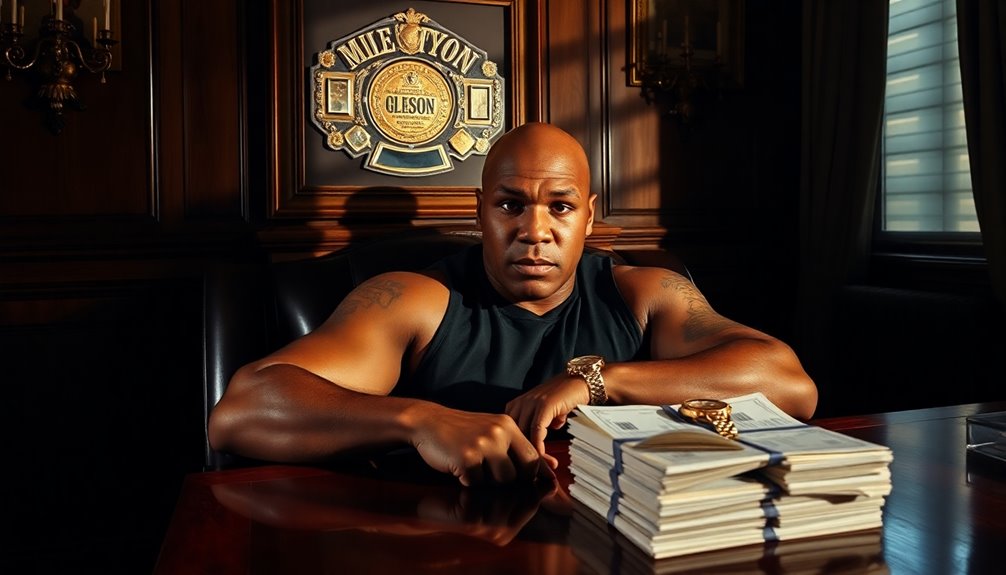When you think of Mike Tyson, you might picture the ferocious fighter who once dominated the boxing ring, but his financial story is just as compelling. With a net worth now estimated at $20 million, it's a far cry from his peak of $300 million. You might wonder how someone with such immense success could face such drastic fluctuations in wealth. As we explore the sources of Tyson's income, his business ventures, and the challenges he's encountered, you'll gain insight into the complexities of his financial journey. What led to these highs and lows?
Key Takeaways
- As of 2024, Mike Tyson's estimated net worth is $20 million, significantly down from his historical peak of $300 million.
- Tyson's recent fight against Jake Paul earned him a $20 million payday, contributing to his current wealth.
- Throughout his boxing career, Tyson has earned over $400 million from fight purses and $430 million from endorsements and sponsorships.
- His cannabis brand, Tyson 2.0, has generated an impressive $150 million, bolstering his financial recovery post-bankruptcy.
- Despite his current wealth, Tyson's past extravagant spending and financial mismanagement led to a bankruptcy filing in 2003.
Introduction

Mike Tyson, a name synonymous with boxing greatness, has experienced a rollercoaster of financial highs and lows throughout his career.
As of 2024, his estimated net worth stands at around $20 million, bolstered by a recent $20 million payday from his fight against Jake Paul.
However, net worth estimates from various sources fluctuate between $10 million and $15 million.
At his peak, Tyson boasted an astounding net worth of $300 million, with total career earnings also reaching that mark.
Unfortunately, financial challenges led him to declare bankruptcy in 2003, with $23 million in debt.
Since then, Tyson has diversified his income through business ventures and recent fights, gradually recovering his financial stability. His financial recovery has been significantly aided by his cannabis investments, showcasing a shift in his business strategy post-boxing career.
Early Life and Career Beginnings

Born into a challenging environment, Tyson's early life was marked by adversity and struggle. He was born on June 30, 1966, in Brooklyn, New York, and faced abandonment when his father left when he was just two.
Raised in the high-crime neighborhood of Brownsville by his mother, Lorna, Tyson often endured bullying due to his small stature. By age 11, he got involved with the Jolly Stompers gang, engaging in criminal activities.
Financial hardships plagued his family, and after his mother's death when he was 16, Tyson found himself lost.
A turning point came when youth counselor Bobby Stewart discovered him in juvenile detention, leading him to legendary trainer Cus D'Amato, who became a father figure and guided Tyson toward boxing success. This mentorship eventually led to Tyson becoming the youngest heavyweight champion at the age of 20.
Sources of Wealth

Throughout his career, Tyson has amassed a remarkable fortune from various sources. His boxing earnings alone exceed $400 million, with a staggering $103 million purse for his 2002 fight against Lennox Lewis. He also earned $30 million for his bout with Evander Holyfield. In addition to his boxing earnings, Tyson has been scheduled to fight Jake Paul on November 15, 2024, which could further boost his financial gains.
Despite facing legal and financial troubles, including bankruptcy in 2003, Tyson's endorsement deals and sponsorships contributed significantly to his wealth, potentially totaling $430 million. His lucrative pay-per-view events and high-profile fights were major revenue sources.
Post-boxing, he earned $10 million from an exhibition fight with Roy Jones Jr. and launched his cannabis brand, Tyson 2.0, which generated $150 million in 2023, further enhancing his financial portfolio.
Investments and Business Ventures

Investing in diverse business ventures has become a significant part of Tyson's financial strategy. He's poured resources into the plant-based industry, notably investing in Mr. Charlie's Told Me So through Carma HoldCo. This fast food chain aims to expand in the U.S. and internationally while focusing on hiring individuals from disadvantaged backgrounds. Tyson's backing is expected to accelerate franchise rollout, enhancing the brand's growth potential.
Additionally, Tyson founded Tyson 2.0, a cannabis brand that's become the best-selling celebrity cannabis brand, generating $150 million in 2023. With a licensing model, franchisees can grow and sell branded cannabis products. Tyson's partnerships and collaborations further enhance his investments, leveraging his celebrity status for market expansion and visibility, ensuring his ventures are both socially impactful and financially lucrative.
Lifestyle and Spending Habits

Mike Tyson's financial journey isn't just about smart investments and business ventures; it's also marked by a lifestyle of extravagant spending that often overshadowed his earnings.
You might be surprised to learn he once spent $5 million in just a few days during his prime. Despite earning over $500 million throughout his career, his lavish lifestyle led to significant financial strain. Former heavyweight boxing champion, he bought a 50,000 square foot mansion for over $2 million, owned two Bengal tigers, and even splurged on a custom gold bathtub worth $2.2 million.
Constant parties, high-end jewelry, and luxury cars characterized his excess. This relentless pursuit of indulgence contributed to his eventual financial woes, showcasing how lifestyle choices can impact wealth over time.
Controversies or Financial Challenges

While many remember Tyson for his incredible talent in the boxing ring, his life outside of it has been riddled with controversies and financial challenges that have significantly impacted his legacy.
After earning nearly $300 million, you'd think he'd be set for life, but mismanagement and lavish spending drained his wealth. He relied on others to handle his finances, leading to debts that exceeded his assets. Financial issues have been attributed to excessive spending on mansions, luxury cars, and jewelry.
Legal disputes, including a $100 million lawsuit against Don King, piled on the pressure, racking up over $9 million in legal fees.
By 2003, Tyson found himself filing for Chapter 11 bankruptcy with about $23 million in debt, including significant amounts owed to the IRS.
These troubles have overshadowed his boxing accomplishments.
Conclusion

Although Tyson's journey has been tumultuous, his current net worth of approximately $20 million reflects a significant recovery from past financial struggles.
Once peaking at around $300 million, Tyson's financial mismanagement led to bankruptcy in 2003. However, he's successfully rebuilt his wealth through smart business ventures, including his cannabis brand, Tyson 2.0, and partnerships with various companies. His recent payday from fighting Jake Paul also boosted his income. You can see how he's diversified his revenue streams, hosting the "Hotboxin'" podcast and venturing into clothing and energy supplements, which have contributed to his ongoing financial stability.
Tyson's story is a testament to resilience and learning from past mistakes, proving that it's possible to rise again after facing significant challenges.
Frequently Asked Questions
How Did Mike Tyson's Boxing Style Contribute to His Wealth?
Mike Tyson's unique boxing style played a huge role in his wealth.
You'd see his peek-a-boo stance and explosive combinations overwhelming opponents, leading to quick knockouts. His head movement allowed him to dodge punches, creating opportunities for powerful counterpunches.
This aggressive yet effective technique not only earned you significant fight purses but also attracted lucrative sponsorships and pay-per-view bonuses, solidifying his status as one of boxing's all-time greats and boosting his financial success.
What Notable Records Did Mike Tyson Achieve During His Boxing Career?
Mike Tyson achieved remarkable records throughout his boxing career.
You'd see he became the youngest heavyweight champion at just 20 years old and unified the WBA, WBC, and IBF titles.
His power's evident in his first 19 fights, all won by knockout, with 24 first-round knockouts overall.
Notably, he knocked out Michael Spinks in just 91 seconds, solidifying his status as a boxing legend.
Tyson's achievements truly highlight his dominance in the sport.
Has Mike Tyson Ever Faced Bankruptcy?
Yes, Mike Tyson faced bankruptcy in 2003, filing for Chapter 11 after accumulating over $27 million in debts.
You'd find it surprising that even the Baddest Man on the Planet could struggle financially, owing millions to the IRS and other creditors. His excessive spending on luxuries and mismanagement of funds contributed to his downfall.
However, he later recovered by shifting focus to acting and launching successful business ventures, regaining financial stability.
What Charitable Causes Does Mike Tyson Support?
Mike Tyson supports several charitable causes, focusing primarily on children from broken homes through the Mike Tyson Cares Foundation.
This foundation provides essential services like healthcare, shelter, and mentoring. He also donates to pediatric cancer initiatives, significantly aiding families in need.
How Has Mike Tyson's Public Persona Affected His Earnings?
Mike Tyson's public persona has significantly shaped your earnings. His reputation as "The Baddest Man on the Planet" attracted lucrative fight contracts and pay-per-view deals, boosting your income.
However, controversies and legal troubles tarnished your image, leading to diminished opportunities and sponsorships.
Despite setbacks, your ability to reinvent yourself through ventures like cannabis and entertainment has helped restore your brand, proving that a strong persona can both elevate and challenge your financial success.
Conclusion
In summary, Mike Tyson's financial journey is as captivating as his boxing career. From his impressive peak of $300 million to his current net worth of $20 million, Tyson's story highlights both incredible success and significant challenges. Despite his ups and downs, he continues to leverage his fame through business ventures and endorsements. As the "Baddest Man on the Planet," Tyson's resilience shows that even after financial setbacks, it's possible to rise again and forge a new path.









